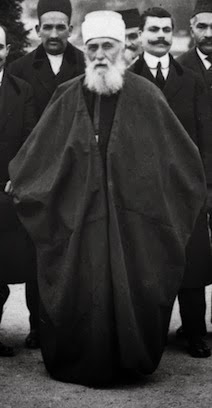Before we leave California, I wanted specially to mention the two famous Goodall women--Helen and daughter Ella. Last year I wrote: "Yesterday I was in the Baha'i National Archives. Exhausted from working on the film in Chicago and Wilmette for two days, I sat in a daze, wondering what I could do in a half hour in the Archives. Kind Lewis Walker brought me the box of Goodall papers, and as I looked into three or four folders, I was astonished at the notes--mostly typewritten on thin sheets of yellowed paper--penciled with additions and corrections.
"The night before Charleen Maghzi (coincidentally at the House of Worship) had marveled to me about the details Ella had preserved--which helped, of course, with Mahmud's inaccuracies."
I feel as if I have only touched lightly on the soil of the Master's visit to California and know little about the two courageous, generous, and extraordinary Goodall women. So many others, especially Charleen, are aware of the details and nuances of the California days. Perhaps they will offer comments and additions to the blog postings! Below, a story, found on-line.
Ella Goodall Cooper, an early American Baha’i who along with her mother, Helen Goodall,
went to Akka as pilgrims in 1899 and 1908, wrote the following touching account:
One day...I had joined the ladies of the Family in the room of the Greatest Holy Leaf for early
morning tea, the beloved Master was sitting in His favorite corner of the divan where, through the
window on His right, He could look over the ramparts and see the blue Mediterranean beyond. He
was busy writing Tablets, and the quiet peace of the room was broken only by the bubble of the
samovar, where one of the young maidservants, sitting on the floor before it, was brewing the tea.
Presently the Master looked up from His writing with a smile, and requested Ziyyih Khanum to
chant a prayer. As she finished, a small figure appeared in the open doorway, directly opposite
'Abdu'l-Bahá. Having dropped off his shoes he stepped into the room, with his eyes focused on
the Master's face. 'Abdu'l-Bahá returned his gaze with such a look of loving welcome it seemed
to beckon the small one to approach Him. Shoghi, that beautiful little boy, with his cameo face
and his soulful appealing, dark eyes, walked slowly toward the divan, the Master drawing him
as by an invisible thread, until he stood quite close in front of Him. As he paused there a moment
'Abdu'l-Bahá did not offer to embrace him but sat perfectly still, only nodding His head two or
three times, slowly and impressively, as it to say - "You see? This tie connecting us is not just
that of a physical grandfather but something far deeper and more significant." While we
breathlessly watched to see what he would do, the little boy reached down and picking up the hem
of 'Abdu'l-Bahá's robe he touched it reverently to his forehead, and kissed it, then gently replaced
it, while never taking his eyes from the adored Master's face. The next moment he turned away,
and scampered off to play, like any normal child...At that time he was 'Abdu'l-Bahá's only
grandchild... and, naturally, he was of immense interest to the pilgrims. (Memoir of Ella Goodall Cooper
quoted by Ruhiyyih Khanum, The Priceless Pearl, p. 5)











